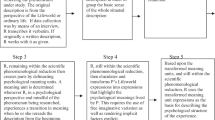Abstract
This essay examines convictions about the importance of speech and activity with reference to an ideal of change, where change may be understood in at least two ways: first, as a process by which persons or things become new or different in reality, and, second, as a grandiose fantasy in which change represents an end in itself and is aligned with ideals such as eternality, centrality, and significance. The essay compares analytic and political situations without suggesting that analytic and political arenas are identical, or that individuals or groups involved in either sort of activity ought to behave identically. Rather, it maintains that much of the dedication to speech and activity relies on a fantasy of change that may be orthogonal, if not antithetical, to a goal shared by psychoanalysis and progressive politics: the facilitation of the capacity to be, to act, and to generate meaningful change for the self and others.
Similar content being viewed by others
References
Baldwin, J. and Mead, M. (1971) A Rap on Race. Philadelphia, PA: J.B. Lippincott. Selections reprinted in M. Popova (2015) A rap on race: Margaret Mead and James Baldwin’s rare conversation on forgiveness and the difference between guilt and responsibility. https://www.brainpickings.org/2015/03/19/a-rap-on-race-margaret-mead-and-james-baldwin/, accessed 1 June 2017.
Bowker, M.H. (2016) Ideologies of Experience: Trauma, Failure, Deprivation, and the Abandonment of the Self. London: Routledge.
Bowker, M.H. and Levine, D.P. (2018) A Dangerous Place to Be: Identity, Conflict, and Trauma in Higher Education. London: Routledge.
Bracher, M. (2006) Radical Pedagogy Identity, Generativity, and Social Transformation. New York: Palgrave.
Caruth, C. (1995) Introduction. In: C. Caruth (ed.) Trauma: Explorations in Memory. Baltimore, MD: Johns Hopkins University Press, pp. 1–12.
Fairbairn, W.R.D. (1952) Psychoanalytic Studies of the Personality. London: Tavistock and Routledge.
Greenberg, J.R. (2001) The analyst’s participation: A new look. Journal of the American Psychoanalytic Association 49(2): 359–81.
Kohut, H. (1977) The Restoration of the Self. Chicago, IL: University of Chicago Press.
Levine, D. (2004) Attack on Government: Fear, Distrust, and Hatred in Public Life. Charlottesville, VA: Pitchstone.
Levine, D. (2018) Dark Fantasy: Regressive Movements and the Search for Meaning in Politics. London: Karnac.
Levine, D., and Bowker, M.H. (forthcoming) The Destroyed World and the Guilty Self: A Psychoanalytic Study of Culture and Politics. London: Routledge.
Mitchell, S.A. (1997) Influence and Autonomy in Psychoanalysis. Hillsdale, NJ: Analytic Press.
Racker, H. (1968) Transference and Countertransference. Madison, CO: International Universities Press.
Reilly, K. (2016) Read Elie Wiesel’s Nobel Peace Prize acceptance speech. Time. 2 July. http://time.com/4392267/elie-wiesel-dead-nobel-peace-prize-speech/, accessed 5 July 2018.
Sartre, J.-P. (1956) Being and Nothingness. Translated by H.E. Barnes. New York: Philosophical Library.
Schafer, R. (1983) The Analytic Attitude. New York: Basic Books.
Simonsen, K. (2002) The body as battlefield. Transactions of the Institute of British Geographers 1(25): 7–9.
Tea, K. (2017) To my friends who are sick of politics. Motherwise. https://motherwiselife.org/to-my-friends-who-are-sick-of-politics/, accessed 5 July 2018.
Winnicott, D.W. (1986) Home is Where We Start From: Essays by a Psychoanalyst. Edited by C. Winnicott, R. Shepard and M. Davis. New York: W.W. Norton.
Author information
Authors and Affiliations
Corresponding author
Additional information
Publisher's Note
Springer Nature remains neutral with regard to jurisdictional claims in published maps and institutional affiliations.
Rights and permissions
About this article
Cite this article
Bowker, M.H. Activity, speech, and change: Progressive politics and regressive fantasies. Psychoanal Cult Soc 24, 105–117 (2019). https://doi.org/10.1057/s41282-019-00119-7
Published:
Issue Date:
DOI: https://doi.org/10.1057/s41282-019-00119-7



